Study suggests fungal pretreatments can help reduce environmental impact of pulping
The pretreatments used in the research significantly reduced wood recalcitrance and improved pulp properties.
A study conducted by the Faculty of Sciences and Technology of the University of Coimbra (FCTUC) suggests that pretreatment with ligninolytic fungi can be employed in paper pulp production without compromising its quality.
Ricardo da Costa, a researcher at the Department of Chemistry, and Maria da Graça Carvalho, a professor at the Department of Chemical Engineering, are the first authors of the paper "Reduced Recalcitrance and Improved Pulp Properties in Eucalypt Woods Pretreated with White-Rot Fungi and Mild Alkali", published in the American Chemical Society's journal ‘Industrial & Engineering Chemistry Research’.
According to Ricardo da Costa, “Certain wood pre-treatments using white-rot fungi can reduce both energy consumption and the amount of chemicals used in the pulping process. However, these methods have not been extensively researched, especially in the Portuguese context.
Therefore, "our main objective was to address this gap and develop biotechnological methods that could assist in the production of paper pulp without compromising its quality," says Maria da Graça Carvalho, further adding that "Biomass pretreatment involves the application of ligninolytic fungi to eucalyptus woodchips before bleaching in the kraft pulping process, specifically Ceriporiopsis subvermispora, Ganoderma lucidum, Phanerochaete chrysosporium, Pleurotus ostreatus and Trametes versicolor".
This study is the outcome of a collaboration between the Departments of Chemistry, Chemical Engineering, and Life Sciences at FCTUC, as part of the 'Inpactus' project, which involves several international partners, including the Universities of York and Wales in the UK.
The scientific article is available here .


